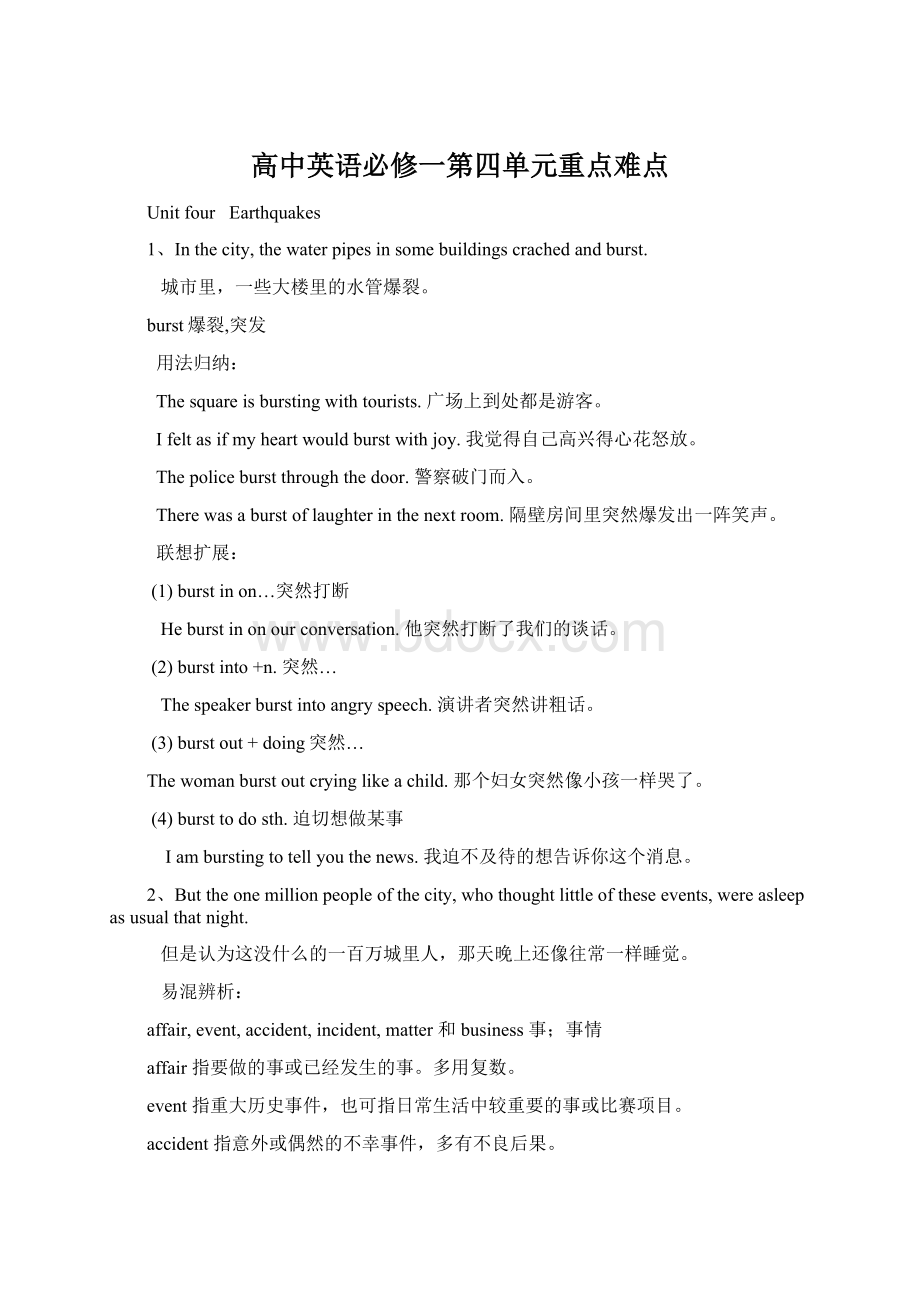高中英语必修一第四单元重点难点.docx
《高中英语必修一第四单元重点难点.docx》由会员分享,可在线阅读,更多相关《高中英语必修一第四单元重点难点.docx(15页珍藏版)》请在冰豆网上搜索。

高中英语必修一第四单元重点难点
Unitfour Earthquakes
1、Inthecity,thewaterpipesinsomebuildingscrachedandburst.
城市里,一些大楼里的水管爆裂。
burst爆裂,突发
用法归纳:
Thesquareisburstingwithtourists.广场上到处都是游客。
Ifeltasifmyheartwouldburstwithjoy. 我觉得自己高兴得心花怒放。
Thepoliceburstthroughthedoor.警察破门而入。
Therewasaburstoflaughterinthenextroom. 隔壁房间里突然爆发出一阵笑声。
联想扩展:
(1)burstinon…突然打断
Heburstinonourconversation.他突然打断了我们的谈话。
(2)burstinto+n.突然…
Thespeakerburstintoangryspeech.演讲者突然讲粗话。
(3)burstout+doing突然…
Thewomanburstoutcryinglikeachild.那个妇女突然像小孩一样哭了。
(4)bursttodosth.迫切想做某事
Iamburstingtotellyouthenews.我迫不及待的想告诉你这个消息。
2、Buttheonemillionpeopleofthecity,whothoughtlittleoftheseevents,wereasleepasusualthatnight.
但是认为这没什么的一百万城里人,那天晚上还像往常一样睡觉。
易混辨析:
affair,event,accident,incident,matter和business事;事情
affair指要做的事或已经发生的事。
多用复数。
event指重大历史事件,也可指日常生活中较重要的事或比赛项目。
accident指意外或偶然的不幸事件,多有不良后果。
incident与重要事件有关的事情,尤指政治、军事上有争议的情况。
matter需要认真考虑的事情。
business日常事务、商业事务;还可以是公事。
3、Thesufferingofthepeoplewasextreme.人们极度痛苦。
suffer
用法归纳:
A,受苦Hesufferedterriblywhenhismotherdied.
B,受到损失 IfIlost,myself-esteemwillsuffer.
C,遭受 Hesufferednopain
联想扩展:
sufferfrom
1、受…之苦 Isufferedmostfromlackofrest.
2、患…病 Iamsufferingfromacold.
特别提示:
suffer表示“患…病”时,后面一般跟疾病名称。
即时活用:
_______suchheavypollutionalready,itmaynowbetoolatetocleanuptheriver.
A.Havingsuffered B.Suffering C.Tosuffer D.Suffered
答案:
A
4、Two-thirdsofthemdiedorwereinjuredduringtheearthquake.
地震中,有三分之二的人死亡或受伤。
易混辨析:
injure;hurt;wound;harm 伤害
injure比hurt正式,hurt多指伤痛,而injure则指损害健康、成就、容貌等,强调功能的损失。
hurt既可指肉体上的伤害,也可指精神上、感情上的伤害。
指肉体上的伤害时,hurt可与badly,slightly,seriously等连用;但若果指精神上的创伤,只能用verymuch,rather/deeply。
wound指枪伤、刀伤、刺伤等皮肉之伤,是出血的、严重的伤,特指战场上受伤。
可以是肉体上的伤害,也可指精神上的创伤。
harm表示引起对身体、物质或精神上的损害,常指伤害人的肉体,损坏东西以及损害健康、品质、事业等。
即时活用:
1、Didyousaythatourneighbor______intheaccident?
A.badlyhurted B.wasbadlyhurted C.hadbadlyhurted D.wasbadlyhurt
答案:
D
2、Mychest_____whenItakeadeepbreath,doctor.
A.hurts B.wounds C.harms D.injure
答案:
A
3、Therewasafightinthestreetyesterday.Threepeoplewereseriously____.
A.hurt B.killed C.broken D.cut
答案:
A
4、Theoldladydiedfromthe_____onherhead;shewas_______whencleaningwindowsontheladderwhenshefelloffit.
A.injury;injured B.wound;wound C.wounded;hurt D.hurt;injured
答案:
A
5、Thebusdriverwasbadly___onbothlegsinthetrafficaccident.
A.wounded B.broken C.injured D.destroyed
答案:
C
5、Thenumberofpeoplewhowerekilledorinjuredreachedmorethan400,000.
伤亡人数达到四十多万。
reach
用法归纳:
(1)到达
Thestartedearly,hopingtoreachtherebeforedark.它们很早就出发,希望天黑前到达那里。
易混辨析:
reach;get;arrive到达
reach后直接加地点;get加to再加地点;arrive后加at/in再加地点,at后加小地点;in后加大地点。
如果表示地点的词是副词,get和arrive后都不能用介词。
另外,只表示“到了”,不强调到什么地方用arrive。
(2)达到
Thenumberofthestudentsinourschoolwillreach2000nextyear.
我们学校学生的数量明年会达到2000。
(3)用手或脚够到
Canyoureachthebookonthetopoftheshelf?
你能够到书架顶上的那本书吗?
特别提示:
reach还可以作名词,表示“用手或脚能够到的范围;管辖范围或臂展”。
Pleasepassmethesalt,it’soutofmyreach.请把盐递给我,我够不到。
(4)传到某人手中/耳中
Yourletterreachedmeyesterday.我昨天收到你的来信。
Thenewsreachedmejustnow.我刚刚听到那个消息。
(5)通向;延伸
Wheredoesthisroadreach?
这条路通向哪里?
即时活用:
1、Mostchildrenstayathomeuntilthey____schoolage.
A.get B.come C.reach D.arrive
答案:
C
2、DearJenny,thankyouforyourletterwhich______onApril1st.
A.arrived B.arrivedat C.arriving D.arrivedme
答案:
A
3、Itis_______thattheletterwill____youthisafternoon.
A.mostlike;arrive B.likely;reach C.mostlylike;get D.bestlike;reach
答案:
B
6、Brickscoveredthegroundlikeredautumnleaves.砖头象秋天的红树叶一样覆盖着地面。
cover
用法归纳:
(1)覆盖
Theplaygroundiscoveredbyfallenleaves,weshouldcleanit.操场被落叶覆盖,我们应该清扫。
特别提示:
表示“覆盖”时,常用cover…with/by句型,并且译法比较灵活。
Iamcoveredbydust.我满身都是土。
Shecoveredherfacewithherhands.她用双手捂着脸。
(2)包括;包含;涉及
Thestudyofphysicscoversmanysubjects.
(3)保护;掩护
Themothercoveredthebabyfromthefallingceiling.母亲保护婴儿不受下落的天花板的伤害。
(4)走完多少路;看完多少页书。
Icancover100Lionfootaday.我一天不行能走100里。
Howmanypageshaveyoucovered?
你看完了多少页书?
(5)占多大面积
Ourschoolcoversanareaof60.000squaremeters.我们学校占地60000平方米。
特别提示:
表示“占多大面积”用…coversanareaof+数词。
(6)采访
Thechiefeditorsentareportertocovertheevent.主编派了一记者去采访整个事件。
易混辨析:
cover和interview
cover表示“采访”时,表示对整个事件的采访;而interview多指对人的采访。
即时活用:
1、Thefarmishuge,lyingbetweenthevalleys,and____anareaof15squarekilometers.
A.covered B.beingcovered C.covering D.covers
答案:
D
2、Thisisalonghardwinter,witheverything_______white.
A.covered B.coveredby C.covering D.coveringwith
答案:
B
3、Thisbookissaidtobeaspecialonewhich________manyeventsnotfoundinotherhistorybooks.
A.writes B.covers C.prints D.reads
答案:
B
4、Thisisalonghardwinter,witheverything_______white.
A.covered B.coveredby C.covering D.coveredwith
答案:
D
5、Thefarmishuge,lyingbetweenthevalleys,and____anareaof15squarekilometers.
A.covered B.beingcovered C.covering D.covers
答案:
D
7、Thearmyorganizedteamstodigoutthosewhoweretrappedandtoburythedead。
解放军组成小分队,将受困的人们挖出来,将死者掩埋。
digout挖出;发现;捐钱
Itisnoteasytodigoutthepast.发掘过去的历史是不容易的。
Hewasburiedbyanavalancheandhadtobedugout.他遇雪崩被埋住了,得把他挖出来。
联想扩展:
digdown挖下 digin开始细致的工作digat挖苦;嘲笑某人digdeep挖深;挖出来
digfor发掘;搜集diginto钻研digup掘起;挖出
8、Tothenorthofthecity,mostofthe10,000minerswererescuedfromthecoalminesthere.
在城市北边,一万名矿工中的大多数被从煤矿中救了出来。
表示方位的介词in/on /to /off
用法归纳:
(1)in表示在范围里的某个方向
ShanghaiisintheeastofChina.上海在中国的东部。
(2)on表示接壤
CanadaisonthenorthoftheUSA.加拿大在美国北边。
(3)to表示不在范围里,也不接壤
JapanliestotheeastofChina.日本在中国东边。
特别提示:
上边的句子可以改写为:
JapanlieseastofChina.
或者
EastofChinaliesJapan.
特别提示:
改正过的句子省略了介词to,原因在于表示方向的名词还可以作副词,表示“在什么方向”或“去什么方向”。
(4)off表示
A.在范围里但不接壤(多指各国的岛屿)
TaiwanisofftheeastofChina.台湾在中国的东部。
B.在离…不远处
Myhouseisoffthemainroad.我家离大路不远。
即时活用:
1、Taiwanlies______thesoutheastofFujian,whichis______southeastofChina.
A.in;on B.to;in C.on;in D.to;on
答案:
B
2、Theytraveled________,allthewayuptoWisconsin.
A.thenorth B.inthenorth C.north D.thesouth
答案:
C
9、Itissaidbuttruethatpeopledieinearthquakesfromfallingfurnitureandbricks.
据说但也是真的地震中人们被倒下的家具和砖头压死。
it作主语的几个常考句型
用法归纳:
(1)作形式主语,代替动词不定式。
句型为:
Itis+adj./n.+for/ofsb.todosth.
Itisapityformetomissthelecture.很遗憾我没听到那节课。
Itisdifficultformetoworkoutthemathproblem.算出那道数学题对我来说太难了。
Itisverykindofyoutohelpme.帮助了我,你这个人太好了。
特别提示:
这个句型中,名词后介词用for;形容词后的介词既可以用for,也可以用of。
形容词如果能修饰人,形容词后用of;形容词如果不能修饰人,形容词后用for。
(2)作形式主语,代替that从句。
句型为:
Itis+adj.+that从句
ItisimportantthatyoustudyEnglishwell.你们学好英语是很重要的。
特别提示:
1、当说话人表示惊奇,that从句谓语要用虚拟语气,即should+动词原形,should可以省略。
Itisimpossiblethathe(should)speakillofyoubehindyou.他在你背后说你坏话是不可能的。
2、当说话者认为应该如此时,that从句中的should不省略。
Itisnaturalthatheshouldfail. 他失败是很自然的。
(3)作形式主语,代替动名词 句型为:
Itisnouse/uselessdoingsth.做什么是没用的。
Itisnogooddoingsth.做什么没好处。
/做什么没益处。
Itisawasteoftimedoingsth.做什么是浪费时间。
Itisnogoodsmoking.吸烟没好处。
Itisawasteoftimeplayingpcgames.玩电脑游戏是在浪费时间。
特别提示;
Itisawasteofmoney/energytodosth.做某事是浪费钱财/精力。
Itisawasteofmoneytobuytheseuselessthings.买这些无用的东西时间浪费钱财。
(4)Itis+过去分词+that…据…
ItisreportedthatChinawillsendupanotherman-madesatellite.
据报道中国将再发射一颗人造卫星。
特别提示:
1、能用于这个句型的动词有:
say;report;think;suppose;believe;consider;imagine;hope;wish;expect;know等。
2、上面的复合句ItisreportedthatChinawillsendupanotherman-madesatellite.可以改写为简单句Chinaisreportedtosendupanotherman-madesatellite.
联想扩展:
Asis+过去分词,+句子 据…
Asisreported,Chinawillsendupanotherman-madesatellite.
据报道中国将再发射一颗人造卫星。
特别提示:
用it作形式主语时,从句要用that引导。
而用as作主语时,要用逗号把从句和主句分开。
(5)引导强调句型 句型为:
Itis/was+被强调部分+that/who/whom+剩余部分
特别提示:
强调句用于强调陈述句的某个成分。
除了谓语,其他成分都能被强调。
Imethiminthestreetyesterdaybychance.
ItwasyesterdaythatImethiminthestreetbychance.
ItwasinthestreetthatImethimyesterdaybychance.
特别提示:
1、如果陈述句的主语或宾语是人,强调句的连接词用who或whom,其他情况一律用that。
2、注意强调句型的一般疑问句和特殊疑问句形式。
Wasityesterdaythatyoumethiminthestreetbychance?
Whenwasitthatyoumethiminthestreetbychance?
(6)表示时间
A.Itis/hasbeen+时间段+since从句 从过去某个时间到现在多长时间了
Itisover30yearssinceChinabeganitsreform.从中国改革到现在已经30多年了。
B.Itwas/hadbeen+时间段+since从句从过去的过去倒过去某个时间多长时间了
Ithadbeen29yearssinceChinabeganitsreform.从新中国成立到中国开始改革有29年。
特别提示:
理解Itwas/hadbeen+时间段+since从句句型时,理解时把since从句作为一个时间点向前推,会推到一个时间,翻译时,从那个时间点向后翻译。
即时活用:
1、Itis______youdealwithdifficultiesthatshows_____youarereallylike.
A.what;what B.how;what C.how;that D.which;how
答案:
B
2、________,hehasfinishedhisjobaheadoftime.
A.Asisexpected B.Whichisexpected C.Itisexpected D.Itisasexpected
答案:
A
3、It_______sixyearss